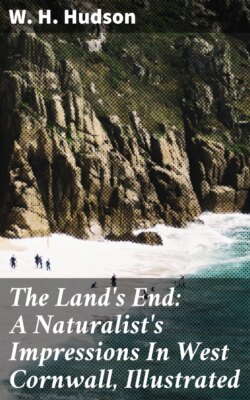Читать книгу The Land's End: A Naturalist's Impressions In West Cornwall, Illustrated - W. H. Hudson - Страница 21
На сайте Литреса книга снята с продажи.
CHAPTER V BOLERIUM: THE END OF ALL THE LAND
ОглавлениеTable of Contents
Cliff scenery and headlands—The Land's End sentiment—Pilgrims and how they are affected—Wilkie Collins—The child's vision—Books on Cornwall—A Trip to the Far West—Sir Humphry Davy—Wesley—Winter nights at the Land's End—Lighthouses—Associations and speculations—The scene of great tragedies in the past.
EVERY day, even in winter, if the weather be not too bad, but chiefly during the nine months from March to November, pilgrims come to this wind-swept, wave-beaten point to gaze and set their feet upon the little rocky promontory of the Land's End. It is less bold and impressive than many others of the hundred headlands at this western extremity of England between St. Ives and Mount's Bay. From this or that projecting point, commanding a view of the coastline for some distance, one may count a dozen or more of these headlands thrust out aslant like stupendous half-ruined buttresses supporting the granite walls of the cliff. They are of a sullen brown colour and rough harsh aspect, and in places have the appearance of being built up of huge square blocks of granite, and at other points they form stacks of columns as at the Giant's Causeway. The summits of these headlands are often high, resembling ruinous castles placed on projecting points of the cliff; they are confused masses of rocks of many shapes, piled loosely one upon the other, their exposed surfaces clothed over with long coarse grey lichen. Large gulls, daws and cormorants sit or stand here and there on the ledges and prominent points, the herring gulls clamorous at the sight of a human form; the restive daws quitting their stands to wheel about at intervals, rising and falling, soon to settle down again; the cormorants silent and motionless, standing erect with curved, snaky necks, like birds carved in ebony.
Stealing quietly among these hoary masses of rock you may see a very wild rabbit, and on a bright, still, winter day, if you are singularly fortunate, you may catch sight of a beast better worth seeing, a cliff fox, lying fast asleep or lightly dozing, stretched at full length on a ledge, looking intensely red in the sunshine, and very conspicuous against the hoary lichened rock. This is his home and castle, which he shares with the rabbits that know his ways, and the birds that are always just out of his reach. Thus do they live together in one house like one antagonistic family in a strange artificial harmony, and do not mix, but come and go and move about freely, and bask in the warm sunshine, and sit up to rub their long ears and whiskers, and spread out their wings to dry, and preen their feathers. Peace and quiet in their castle, while the great waves roll in to beat on its caverned walls beneath, making the earth tremble with their measured blows, covering the black rocks with dazzling white foam, and sending up a mist of spray to the summit.
At intervals between Bay and Bay, a distance of thirty miles, you come upon headlands of this type—Cape Cornwall, Gurnard's Head, Zennor Cliffs and others, to the north of Land's End, while just south of it you have the noblest rock scenery of this coast, including the stupendous cliffs of Tol-Pedn-Penwith and Treryn Dinas, with its famed Logan Stone. Bolerium itself, the narrow promontory of piled rocks of the Land's End and the flat bit of country adjoining it is, sentiment apart, one of the least interesting points on the coast.
But the sentiment is a very great thing and interesting to observe. And this is easy, since the pilgrims mostly come by way of Penzance, distant about a dozen miles, travelling in batches of twenty-five or thirty or more, packed closely in some public conveyance; so that one has but to join the crowd and, sitting among them, watch their faces out of the corners of his eyes. They are a mixed company of men and women of all conditions, from all parts of the country, with some Americans and Colonials. It is indeed curious to see an identical feeling on faces so unlike, from the very young who do not try to conceal it, to the very aged and almost worn-out globe wanderers, who are now nearly at the end of their life's pilgrimage, and have seen pretty well all that was worth seeing on this wide earth except this one famous spot which by chance has been left to the last.
